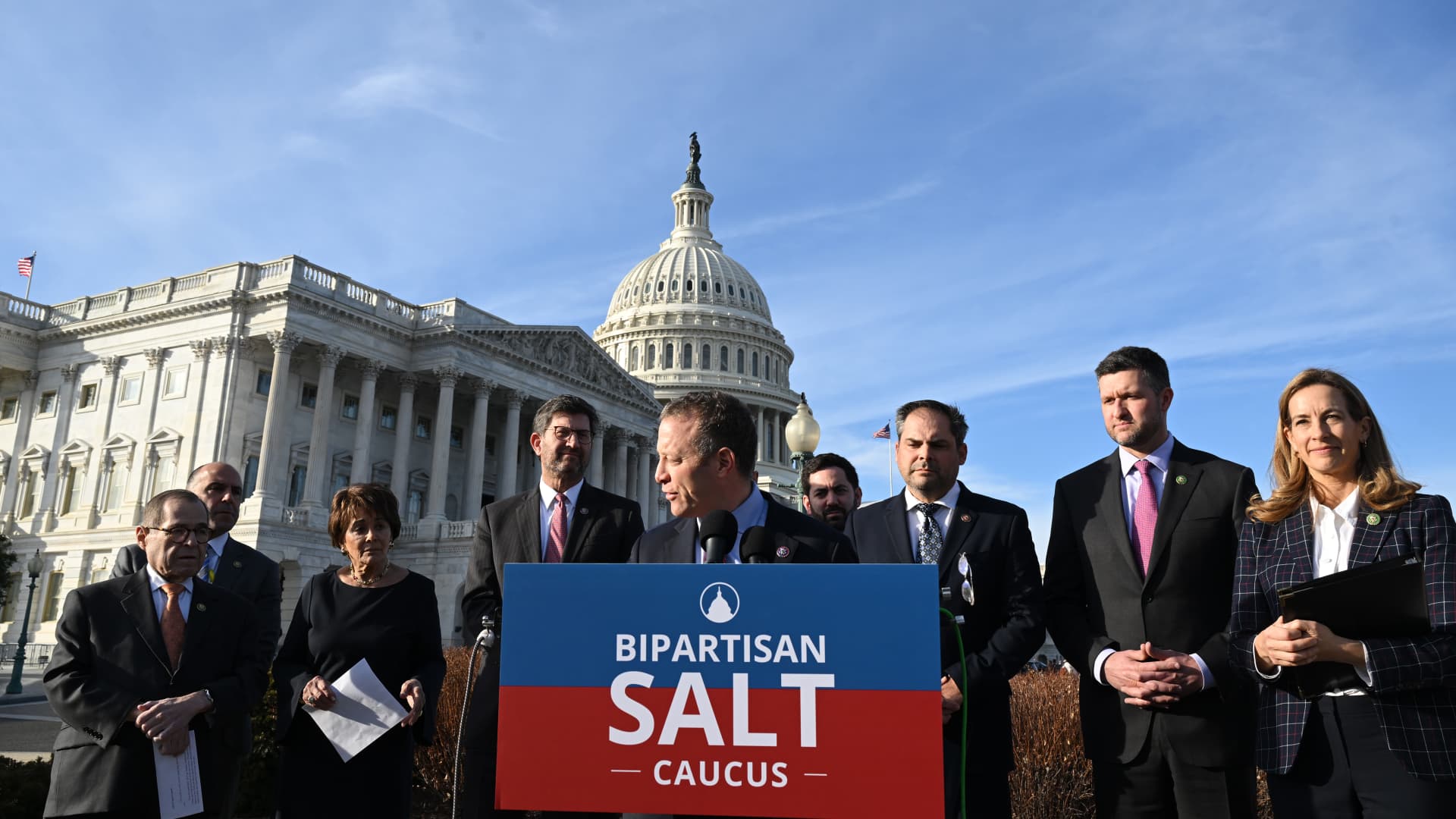U.S. Representative Josh Gottheimer (D-NJ) speaks during a press conference about the SALT Caucus outside the United States Capitol on Wednesday February 08, 2023 in Washington, DC.Â
Matt McClain | The Washington Post | Getty Images
House lawmakers are using former President Donald Trump’s own words as leverage to pressure their colleagues into preserving the original state and local tax deduction, with a fight set to take shape next year.
The SALT deduction allows tax payers to deduct up to $10,000 of property, sales or income taxes that have already been paid to state and local governments. Historically, most of the tax payers who claim the deduction reside in high tax states such as New York, Connecticut, New Jersey and California.
But the cap on SALT became law when Trump was president and after he signed his $1.5 trillion tax bill in 2017, using the new version of the deduction as a pay for method. There was no cap on SALT prior to the Trump tax bill.
House lawmakers are now strategizing how to maintain what could be an unlimited SALT tax deduction in the next Congress, as the SALT cap provision from the Trump tax bill is set to expire on Dec. 31, 2025.
If Trump becomes president again, and Republicans have a majority in both the House and Senate, some House Republicans are pushing their party’s leadership to look at alternative payment methods for Trump’s tax plan, which includes cutting the corporate tax rate from 21% to 15%, according to Rep. Andrew Garbarino, R-N.Y.
Some of those recent conversations have featured Trump’s new stance on bringing back the full SALT deduction, despite his bill being the cause for the $10,000 cap.
Garbarino said he, along with Reps. Anthony D’Esposito, R-N.Y and Nick LaLota, R-N.Y., met with House Ways & Means Committee chairman Jason Smith, R-Mo., as recently as Tuesday on Capitol Hill about the need to restore the full SALT deduction.
During the meeting, the three New York Republicans pointed to Trump’s promise in a social media post to “get SALT back” if he were to become president as a way to encourage Smith to stay away from making any major alterations to the SALT deduction once it expires late next year. House Ways & Means is responsible for helping write and pass tax legislation.
“He [Trump] wants it back,” Garbarino told CNBC in an interview about how they made their recent pitch to Smith. Â The House Ways & Means chair “said ‘look guys, we are looking at all [pay for] options,'” Garbarino said.
Rep. Young Kim, R-Calif., told CNBC in a statement that the SALT cap is “hurting” her constituents and said Trump’s most recent take on SALT shows he’s listened to “Americans across the country hurting from the SALT cap.”
“We’ll be sure to have a seat at the table during discussions for the 2025 tax package,” Kim said, pointing to lawmakers in SALT reliant states who also want to maintain the original deduction next Congress.
Garbarino said he estimates there are at least a dozen House Republicans who won’t support a tax bill with a SALT cap at $10,000 and, at a minimum, will fight for the cap to be at a much higher level.
Some House Democrats have their own plans to bring back and keep the standard SALT deduction after the cap expires, according to Rep. Josh Gottheimer, D-N.J.
The New Jersey House lawmaker said in an interview with CNBC he wants to see the SALT cap expire in 2025 and if Democrats and Republicans from states which rely on the full SALT deduction prove to be critical votes in the House, they’ll stand in the way of legislation that maintains the cap.
“I would just say if you have a five seat Democratic majority, we will have enough people from SALT states to put the full deduction back in place and lower taxes for middle class families,” said Gottheimer. “It will be a battle.”

